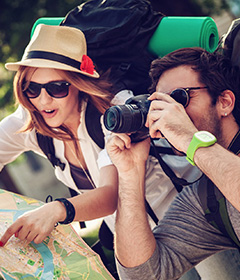Travel has the power to transform, educate, and inspire. But with countless options available, how do you select activities that truly enrich your journey? Choosing meaningful travel experiences goes beyond ticking off bucket list items or following the well-worn tourist path. It’s about aligning your adventures with your values, expanding your horizons, and creating lasting positive impacts—both for yourself and the destinations you visit.
Whether you’re planning a short getaway or an extended expedition, the activities you choose can elevate your trip from a simple holiday to a life-changing experience. From sustainable tourism practices to immersive cultural encounters, this guide will help you navigate the myriad options and craft a journey that resonates with your personal goals and ethics.
Aligning travel activities with personal values and goals
The first step in creating a meaningful trip is to reflect on your personal values and goals. What matters most to you? Are you passionate about environmental conservation, cultural exchange, personal growth, or giving back to communities? Your answers to these questions should guide your activity selection.
Consider creating a travel mission statement that encapsulates your intentions for the trip. This could be as simple as “To deepen my understanding of sustainable living practices” or “To challenge myself physically while supporting local economies”. Having this clear focus will help you filter through the multitude of options and choose activities that truly align with your purpose.
It’s also important to consider your learning style and preferences. Are you energised by hands-on experiences or do you prefer observation and reflection? Do you thrive in group settings or seek out solitary adventures? Tailoring your activities to your personal style will ensure a more engaging and fulfilling experience.
Travel is not just about seeing new places; it’s about becoming a better version of yourself through the experiences you choose.
Remember that meaningful travel doesn’t always equate to grand gestures or extreme challenges. Sometimes, the most impactful experiences come from simple, authentic interactions or moments of quiet reflection in a new environment. The key is to be intentional about your choices and open to the transformative potential of each activity.
Sustainable tourism: Eco-Friendly activity selection
As awareness of tourism’s environmental impact grows, so does the importance of choosing eco-friendly activities. Sustainable tourism aims to minimise negative effects on local environments and communities while maximising positive contributions. When selecting activities, look for options that prioritise conservation, support local economies, and promote responsible practices.
Carbon-neutral transportation options in popular destinations
One of the most significant ways to reduce your travel footprint is by choosing low-impact transportation. Many popular destinations now offer carbon-neutral or low-emission options for exploring. For example, in Amsterdam, you can join guided bike tours to explore the city’s historic canals and architecture. In Costa Rica, electric boat tours through the mangroves provide a silent, emissions-free way to observe wildlife.
When possible, opt for public transportation, walking tours, or human-powered activities like kayaking or cycling. These choices not only reduce emissions but often provide a more intimate experience of your destination.
Participating in local conservation efforts: case studies
Engaging in conservation activities can add depth and purpose to your travels. Many destinations offer opportunities to participate in local environmental projects. In Thailand, for instance, you can join coral reef restoration efforts, planting fragments of coral to help rejuvenate damaged ecosystems. In Costa Rica, sea turtle conservation programmes allow visitors to assist with nest protection and hatchling releases.
These hands-on experiences not only contribute to important conservation work but also provide unique insights into local ecosystems and the challenges they face. Always ensure that the programmes you choose are run by reputable organisations with a proven track record of ethical and effective conservation practices.
Selecting accommodations with strong environmental practices
Your choice of accommodation can significantly impact your travel footprint. Look for hotels, ecolodges, and guesthouses that have implemented strong environmental practices. This might include using renewable energy sources, implementing water conservation measures, or sourcing food from local, organic producers.
For example, the Feynan Ecolodge in Jordan operates entirely on solar power and employs local Bedouin communities. In Costa Rica, the Lapa Rios Lodge protects 1,000 acres of primary rainforest and supports local conservation and community development initiatives. Choosing such accommodations aligns your stay with your values and supports businesses that prioritise sustainability.
Ethical wildlife encounters: guidelines and certifications
Wildlife tourism can be a powerful tool for conservation when done responsibly. However, it’s crucial to choose ethical wildlife encounters that prioritise animal welfare and habitat preservation. Avoid activities that involve direct contact with wild animals, such as elephant rides or tiger cub petting, as these often involve harmful practices.
Instead, look for wildlife viewing experiences that observe animals in their natural habitats from a respectful distance. Seek out operators certified by organisations like the Global Sustainable Tourism Council or those endorsed by reputable wildlife conservation groups. For instance, in Rwanda, carefully regulated gorilla trekking experiences contribute to the protection of endangered mountain gorillas and their habitat.
Cultural immersion through authentic local experiences
Meaningful travel often involves deep cultural immersion, going beyond surface-level tourist experiences to engage with local communities in authentic and respectful ways. These encounters can foster cross-cultural understanding, support local traditions, and provide rich, memorable experiences for travellers.
Homestay programs: integrating with indigenous communities
Homestay programmes offer a unique opportunity to experience daily life in a different culture. By staying with local families, you gain insights into traditions, customs, and ways of life that are often inaccessible to typical tourists. In Peru, for example, homestays on the islands of Lake Titicaca allow visitors to participate in traditional Quechua family life, from helping with agricultural tasks to learning ancient weaving techniques.
When choosing a homestay programme, look for options that are community-driven and ensure fair compensation for host families. These experiences should be mutually beneficial, providing cultural exchange for travellers and economic support for local communities.
Culinary tourism: Hands-On cooking classes and food tours
Food is a universal language and a gateway to understanding culture. Participating in cooking classes or food tours led by local chefs and food enthusiasts can provide deep insights into a region’s history, agriculture, and daily life. In Thailand, you might learn to prepare traditional dishes in a family home, while in Italy, you could join truffle hunters and their dogs to search for these prized delicacies before learning how to incorporate them into local recipes.
Look for experiences that emphasise local, seasonal ingredients and traditional cooking methods. Many culinary tours also include visits to markets or farms, providing a comprehensive view of the local food system and supporting small-scale producers.
Traditional craft workshops: preserving artisanal skills
Participating in traditional craft workshops not only allows you to learn new skills but also supports the preservation of cultural heritage. In Japan, you might take part in a washi papermaking workshop, learning an art form that dates back over a thousand years. In Morocco, you could learn the intricate patterns of traditional zellige tile-making from master artisans.
These hands-on experiences provide a deeper appreciation for the skill and cultural significance behind local crafts. They also offer a way to support artisans directly, helping to ensure that traditional skills are passed on to future generations.
Language exchange meetups: fostering Cross-Cultural dialogue
Language exchange meetups offer a unique way to connect with locals and improve your language skills simultaneously. Many cities around the world host regular language exchange events where travellers can practice the local language while helping others practice English or other languages they speak.
These informal gatherings provide opportunities for genuine cultural exchange, allowing you to discuss local customs, share experiences, and gain insider tips about the destination. They’re also an excellent way to make local friends and potentially discover off-the-beaten-path experiences that you might not find in guidebooks.
Volunteer tourism: maximising positive impact
Volunteer tourism, or “voluntourism”, has gained popularity as travellers seek ways to give back to the communities they visit. However, it’s crucial to approach volunteer opportunities with careful consideration to ensure that your efforts truly benefit local communities and align with ethical practices.
Evaluating volunteer organisations: transparency and ethics
When considering a volunteer opportunity, thorough research is essential. Look for organisations that are transparent about their operations, impact, and how they use volunteer contributions (both time and money). Reputable organisations should be able to provide clear information about their projects, long-term goals, and how they work with local communities.
Check for partnerships with local NGOs or community groups, as these often indicate a more sustainable and community-driven approach. Be wary of organisations that seem to prioritise the volunteer experience over genuine community needs or that perpetuate harmful stereotypes about the communities they claim to serve.
Skill-based volunteering: matching expertise with local needs
One of the most effective forms of voluntourism is skill-based volunteering, where travellers contribute specific expertise that aligns with local needs. This approach ensures that volunteers can make meaningful contributions without displacing local workers or engaging in tasks they’re not qualified to perform.
For example, a teacher might volunteer to help develop English language curricula for a local school, or a healthcare professional might offer training to community health workers. These skill-sharing opportunities often have a more sustainable impact than short-term, unskilled volunteer work.
Short-term vs. Long-Term volunteering: pros and cons
The duration of your volunteer commitment can significantly impact both your experience and the benefit to the community. Short-term volunteering (a few days to a couple of weeks) can be suitable for specific, time-limited projects or events. However, it’s important to have realistic expectations about the impact you can make in a short period.
Long-term volunteering (several months or more) often allows for more meaningful contributions and deeper cultural immersion. It provides time to understand local contexts, build relationships, and contribute to more substantial projects. However, it requires a greater time commitment and more extensive preparation.
| Short-Term Volunteering | Long-Term Volunteering |
|---|---|
| Suitable for specific events or time-limited projects | Allows for deeper cultural immersion and understanding |
| Limited impact on complex issues | Potential for more substantial contributions |
| Easier to fit into travel plans | Requires significant time commitment and preparation |
| May be more accessible for those with limited time | Often more fulfilling and impactful for both volunteer and community |
Measuring the tangible outcomes of volunteer projects
Assessing the impact of volunteer projects is crucial for ensuring that efforts are truly beneficial. Look for organisations that have clear metrics for measuring outcomes and are transparent about their achievements and challenges. This might include quantitative data (e.g., number of trees planted, students tutored) as well as qualitative assessments from community members and long-term staff.
Be cautious of projects that seem to prioritise volunteer satisfaction over community impact. Meaningful volunteer work should focus on sustainable, community-led development rather than creating dependency or undermining local systems.
Educational travel: expanding knowledge and skills
Educational travel combines the excitement of exploring new places with the enrichment of learning new skills or deepening your understanding of specific subjects. This approach to travel can be particularly rewarding, offering intellectual stimulation alongside cultural experiences.
Specialised tours led by subject matter experts
Many tour operators now offer specialised trips led by experts in various fields, from archaeology and history to wildlife biology and astronomy. These tours provide in-depth knowledge and unique perspectives that go far beyond typical tourist experiences. For instance, you might join an archaeologist-led tour of ancient Mayan sites in Guatemala, gaining insights into recent discoveries and ongoing research.
Look for tours that offer small group sizes and ample opportunity for interaction with the expert guides. The best educational tours balance structured learning with time for independent exploration and reflection.
Attending local lectures and seminars at universities
Many universities around the world offer public lectures or short courses that are open to visitors. This can be an excellent way to gain academic insights into local culture, history, or current issues. For example, during a stay in London, you might attend a public lecture series at the London School of Economics on global political trends.
Check university websites or local event listings for open lectures or consider enrolling in a short course if your travel schedule allows. These experiences can provide valuable context for your travels and opportunities to engage with local academics and students.
Field research opportunities for citizen scientists
Citizen science projects offer travellers the chance to contribute to real scientific research while exploring new environments. These programmes, often focused on wildlife conservation or environmental monitoring, provide hands-on experience in data collection and analysis under the guidance of professional researchers.
For example, in the Galápagos Islands, you might participate in a project monitoring marine iguana populations, learning about ecology and conservation while contributing to important long-term studies. In Australia, coral reef monitoring programmes allow snorkelers and divers to assist in tracking the health of the Great Barrier Reef.
Personal growth through challenging travel experiences
Travel can be a powerful catalyst for personal growth, especially when it pushes you out of your comfort zone. Challenging travel experiences can build confidence, resilience, and self-awareness, leading to profound personal transformations.
Solo travel: navigating unfamiliar territories independently
Solo travel offers unique opportunities for self-discovery and personal development. Navigating new environments alone can build confidence, problem-solving skills, and adaptability. It also often leads to more interactions with locals and fellow travellers, as you’re more approachable when on your own.
Consider starting with shorter solo trips or mixing solo segments into a longer journey if you’re new to independent travel. Many destinations offer group activities or tours that solo travellers can join, providing a balance of independence and social interaction.
Adventure tourism: pushing physical and mental boundaries
Adventure activities that challenge you physically and mentally can lead to significant personal growth. This might involve trekking to Everest Base Camp, learning to scuba dive in the Great Barrier Reef, or undertaking a multi-day wilderness survival course. These experiences not only teach new skills but also reveal inner strengths and capabilities you might not have recognised.
When choosing adventure activities, ensure they match your fitness level and risk tolerance. Always prioritise safety and choose reputable operators with strong safety records and appropriate certifications.
Meditation retreats: cultivating mindfulness in sacred spaces
Meditation retreats offer opportunities for inner exploration and personal growth in supportive, often beautiful environments. These experiences can range from weekend introductions to mindfulness practices to month-long silent retreats in traditional Buddhist monasteries.
For instance, in India, you might join a Vipassana meditation course, spending ten days in noble silence while learning ancient meditation techniques. In Japan, some Zen temples offer short-term stays where visitors can experience traditional monastic life and learn meditation practices.
These retreats can be emotionally and mentally challenging, but they often lead to profound insights and personal transformations. Research different styles and intensities of retreats to find one that aligns with your goals and comfort level.
By thoughtfully selecting activities that align with your values, support local communities and environments, and challenge you to grow, you can create travel experiences that are not just enjoyable, but truly meaningful and transformative. Remember, the most impactful journeys often combine elements of cultural immersion, education, personal challenge, and giving back. As you plan your next adventure, consider how each activity you choose can contribute to a more enriching and purposeful travel experience.


